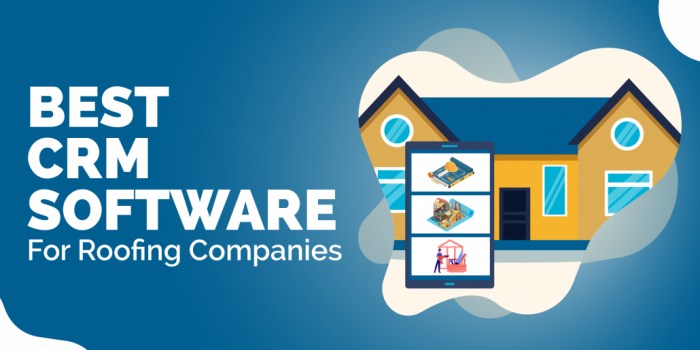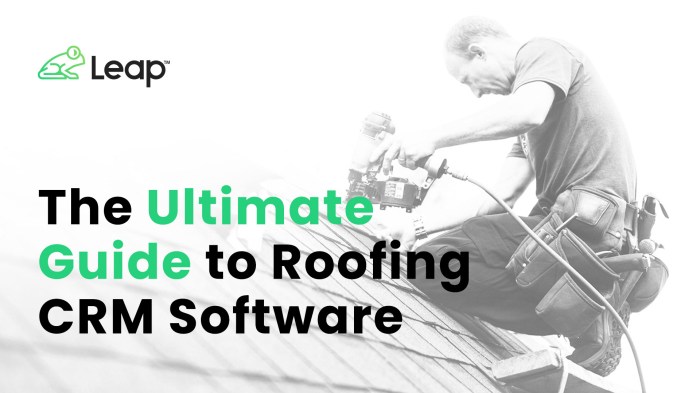CRM software for roofing contractors is revolutionizing the industry, offering a powerful way to manage leads, projects, and client relationships. Efficiently tracking estimates, scheduling installations, and maintaining communication with customers enhances productivity and profitability. This streamlined approach allows roofing businesses to focus on what matters most: delivering exceptional service and growing their bottom line. This exploration delves into the benefits and considerations of implementing CRM solutions tailored to the specific needs of roofing contractors.
From initial contact to final payment, a well-chosen CRM system can automate repetitive tasks, improve team collaboration, and provide valuable insights into business performance. Features like job scheduling, automated email sequences, and customer relationship tracking provide a significant competitive advantage in a busy market. The right CRM can simplify complex processes, leading to increased efficiency and improved client satisfaction.
The roofing industry is competitive. To thrive, you need more than just a skilled crew; you need a system to manage leads, projects, and customer relationships effectively. This is where Customer Relationship Management (CRM) software steps in. A well-chosen CRM can significantly boost your roofing business’s efficiency, profitability, and overall success. This comprehensive guide explores the benefits, features, and selection process of CRM software specifically tailored for roofing contractors.
Efficient CRM software is crucial for roofing contractors to manage leads and projects effectively. Similar benefits extend to other industries, such as the complexities of family law, where a robust system is vital; for instance, check out this resource on crm software for family law to see how it streamlines processes. Returning to roofing, the right CRM can significantly improve client communication and overall business performance for contractors.
Why Roofing Contractors Need CRM Software: Crm Software For Roofing Contractors
Many roofing contractors still rely on spreadsheets, sticky notes, and fragmented communication methods. This approach often leads to missed opportunities, duplicated efforts, and a fragmented customer experience. A dedicated CRM system offers a centralized hub for all your business operations, providing numerous advantages:
- Improved Lead Management: Capture leads from various sources (website forms, phone calls, referrals) and track their progress through the sales pipeline. No more losing potential customers in the cracks!
- Enhanced Customer Communication: Maintain consistent and professional communication with clients throughout the entire process, from initial quote to final payment. Automated email sequences and reminders ensure timely follow-ups.
- Streamlined Project Management: Track project timelines, assign tasks to crew members, and monitor progress efficiently. This helps avoid delays and ensures projects are completed on time and within budget.
- Increased Sales and Revenue: By optimizing lead management and improving customer satisfaction, a CRM directly contributes to increased sales and revenue generation.
- Better Reporting and Analytics: Gain valuable insights into your business performance through detailed reports and analytics. Identify areas for improvement and make data-driven decisions.
- Improved Team Collaboration: Centralized information allows seamless collaboration among team members, improving communication and reducing errors.
- Increased Customer Retention: By providing exceptional customer service and fostering strong relationships, a CRM helps improve customer retention rates.
Key Features of a Roofing CRM
Not all CRM software is created equal. When choosing a CRM for your roofing business, look for these essential features:

Source: ctfassets.net
Lead Management and Tracking, Crm software for roofing contractors
- Lead Capture Forms: Integrate with your website to capture leads directly.
- Lead Scoring: Prioritize high-potential leads based on predefined criteria.
- Lead Assignment: Automatically assign leads to specific sales representatives.
- Lead Nurturing: Automate email sequences to keep leads engaged.
Customer Relationship Management
- Contact Management: Store and manage all customer information in one place.
- Communication Tracking: Record all communication (emails, calls, texts) with customers.
- Customer Segmentation: Group customers based on shared characteristics for targeted marketing.
- Customer Satisfaction Surveys: Gather feedback to improve services.
Project Management Capabilities
- Project Scheduling: Plan and schedule projects efficiently.
- Task Management: Assign tasks to team members and track progress.
- Document Management: Store and access project-related documents (contracts, invoices, photos).
- Progress Tracking: Monitor project timelines and identify potential delays.
Reporting and Analytics
- Sales Reports: Track sales performance and identify top-performing products/services.
- Marketing Reports: Measure the effectiveness of marketing campaigns.
- Customer Retention Reports: Analyze customer churn and identify areas for improvement.
- Customizable Dashboards: Create dashboards that display key performance indicators (KPIs).
Integration with Other Tools
- Accounting Software Integration: Seamlessly integrate with accounting software for streamlined financial management (e.g., QuickBooks).
- Email Marketing Integration: Integrate with email marketing platforms for automated email campaigns (e.g., Mailchimp).
- Scheduling Software Integration: Integrate with scheduling software for efficient appointment booking.
Choosing the Right CRM for Your Roofing Business
Selecting the right CRM involves considering your specific needs and budget. Here’s a step-by-step guide:
- Assess your needs: Identify your business’s key challenges and how a CRM can help address them.
- Set a budget: Determine how much you’re willing to spend on CRM software and related services.
- Research different CRM options: Explore various CRM platforms available, considering features, pricing, and user reviews.
- Request demos: Try out the software before committing to a purchase.
- Read reviews: Check online reviews and testimonials from other roofing contractors.
- Consider scalability: Choose a CRM that can grow with your business.
- Check for integrations: Ensure the CRM integrates with your existing software.
- Look for customer support: Choose a provider that offers reliable customer support.
Frequently Asked Questions (FAQ)
- Q: How much does CRM software for roofing contractors cost? A: Pricing varies widely depending on the features, provider, and number of users. Expect to pay anywhere from a few hundred dollars per month to several thousand.
- Q: Is CRM software difficult to use? A: Most modern CRM platforms are designed to be user-friendly, with intuitive interfaces and helpful tutorials. However, some may require a learning curve.
- Q: Can I integrate my CRM with my existing accounting software? A: Many CRMs offer integrations with popular accounting software like QuickBooks and Xero.
- Q: How long does it take to implement a CRM? A: Implementation time depends on the complexity of your business and the chosen CRM. It can range from a few days to several weeks.
- Q: What are the key metrics to track in a roofing CRM? A: Key metrics include lead conversion rates, customer acquisition cost, customer lifetime value, and project completion rates.
- Q: Can a CRM help me improve my customer service? A: Absolutely! A CRM allows for better communication tracking, personalized interactions, and efficient issue resolution, leading to improved customer satisfaction.
Conclusion
Investing in the right CRM software can be a game-changer for your roofing business. By streamlining operations, improving communication, and providing valuable insights, a CRM empowers you to grow your business, increase profitability, and deliver exceptional customer service. Take the time to research your options, choose the best fit for your needs, and prepare to experience the transformative power of a well-implemented CRM system.
Call to Action
Ready to take your roofing business to the next level? Contact us today for a free consultation and discover how the right CRM can help you achieve your goals!
Ultimately, selecting and implementing the right CRM software can significantly transform a roofing contractor’s business. By streamlining operations, improving communication, and providing valuable data-driven insights, CRM systems empower businesses to achieve greater efficiency, profitability, and customer satisfaction. Investing in a robust CRM solution is an investment in the future growth and success of any roofing contracting firm. The careful consideration of features and integration with existing systems will ensure a smooth transition and maximize the return on investment.
FAQ Section
What are the key features to look for in a roofing contractor CRM?
Essential features include job scheduling, lead management, customer relationship tracking, estimate generation, communication tools (email, SMS), and reporting/analytics capabilities.
How much does CRM software for roofing contractors typically cost?
Pricing varies greatly depending on the features, number of users, and vendor. Expect to find options ranging from affordable monthly subscriptions to more expensive enterprise solutions.

Source: atticsandmore.com
Can a CRM system integrate with my existing accounting software?
Many CRM systems offer integrations with popular accounting software. Check for compatibility before purchasing to ensure seamless data flow.
How long does it take to implement a CRM system?

Source: leaptodigital.com
Implementation time depends on the complexity of the system and the size of the business. It can range from a few weeks to several months.
What kind of training is required to use a roofing contractor CRM?
Most vendors offer training resources, including online tutorials, documentation, and sometimes in-person sessions. The learning curve varies depending on the system’s user-friendliness.
